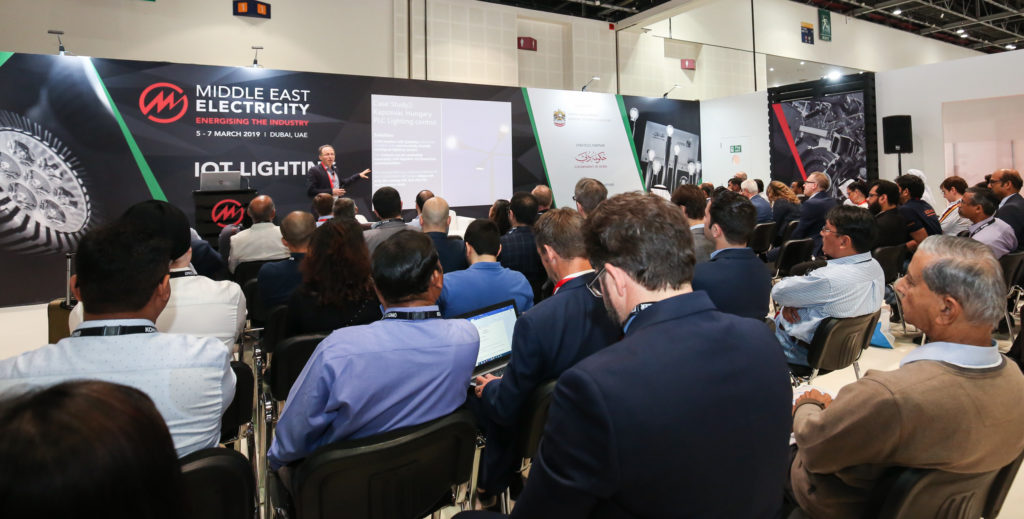Plugging into intelligent street lighting solutions is the smart option for towns and cities around the world to boost efficiency and increase the happiness of residents, a pair of industry experts told the region’s first IoT Lighting conference at Middle East Electricity 2019, the region’s largest event for the power industry, which runs until March 7 at Dubai World Trade Centre (DWTC).
With the term ‘smart city’ a “kind of buzzword” for urban developers, Peter Schwarcz, Principal Engineer at Tungsram Group, a European lighting company that designs and develops light sources from traditional technologies to LED, told delegates that smart street lighting can provide the backbone for smart city infrastructure and urged city planners to switch for the benefits.
During a future-focused session titled ‘Roadmap for Smart Street Lighting’, Schwarcz said converting traditional lighting into LED and implementing a city-wide rollout of IoT luminaires can reduce municipal costs, increase efficiency and “add safety, security and comfort to residents”.
“LED lighting is established technology, we know it works; it has proven ROI and is future-proof so the luminaires can be upgraded,” said Schwarcz who went on to add that smart street lighting can reduce accident rates and increase safety. The leading light engineer said convincing residents of the technology’s benefits in improving quality of life is straightforward because they have “a visual sign”, referring to motion sensors that trigger fluctuating lighting levels depending on traffic.
Schwarcz cited a case study in Hungry where motion-sensored street lighting was installed in a residential area with brightness increasing or dimming dependent the volume of traffic. The engineer added that initially residents voiced concerns over the constant ‘up and down’ of the street lights, but when municipal officials highlighted the objective and the benefits of the project, the people jumped on board and admitted to feeling safer and it became a “modern neighbourhood watch” technique.
Schwarcz highlighted the potential energy savings of 40-50 per cent, adding that smart street lighting can be a revenue generator with IoT luminaires being rented to partners such as security companies or traffic management firms to install CCTV or traffic monitoring systems.
“Income is not just something that can be monetised,” added Schwarcz. It is “the wellbeing of your citizens” because the technology can lead to “crime reduction and higher utilisation of infrastructure.”
The IoT lighting advocate added that the biggest challenge was convincing stakeholders to invest in smart street lighting because return on investment (ROI) isn’t visible.
“The tech is there but the financial model is not there yet. You cannot necessarily see the return on investment. That is what we have to solve. But connected does pay off,” he said, adding that “All stakeholders, manufacturers, municipalities and users have to be open to discuss experiences to make processes.”
Schwarcz’s views were echoed by Pablo Servent, CEO of Smartmation, a leader in telemanagement of public and private lighting, who revealed how his company had transformed Argentina’s capital city Buenos Aires into a 100 per cent smart street lighting-controlled city.
The result of installing 150,000 smart luminaires in Buenos Aires was an 80 per cent increase in efficiency, 35 per cent saving on maintenance costs, a 15 per cent energy saving and 80 per cent resident satisfaction.
Servent outlined the challenges and opportunities of adopting smart street lighting, adding that cities need to agree with electricity suppliers to be charged by effective consumption instead of number of luminaires.
The industry leader agreed with Schwarcz that smart street lighting can be monetised transforming from a “cost centre to a revenue centre”. He said: “For example telecommunications companies are renting lampposts to install 5G mini cells across a city. They need lots of mini cells placed across a city for the technology to work, so this is a real opportunity.”
The IoT Lighting Conference is a new addition to an expanded Knowledge Programme at Middle East Electricity, which continues on March 6-7 with the much-anticipated Revolutionising Power Generation Conference




